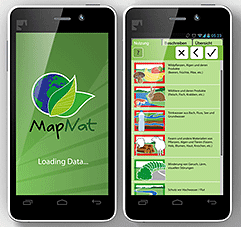News
From 9 to 12 January 2017, ESMERALDA held the second of a series of five planned project workshops aimed at testing the flexible ecosystem services (ES) mapping and assessment methodology under development using real-world case studies. Bringing together both project partners and stakeholders, the workshop aimed to collect feedback on the suitability of the various methods to be used in different decision-making processes.
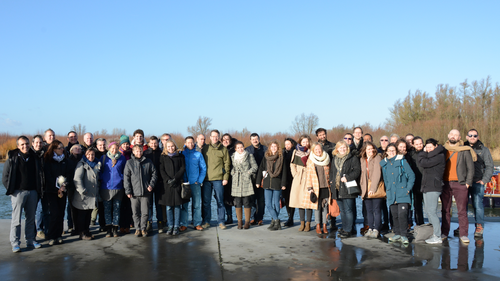
Group photo of the participants at the Amsterdam workshop during the excursion to De Biesbosch National Park. Credit: Pavel Stoev
During the workshop, the 60 participants received an update on the latest developments of the consortium and the flexible methodology developed within ESMERALDA, and had the opportunity to contribute to the methods classification, database generation and methodology development during different break-out sessions.
Using a selection of three case studies, participants were introduced to a set of selected mapping and assessment methods with the aim to enhance the understanding of the practical applicability of different methods across different spatial scales, methods’ complexities and relevant themes. The case studies used came from the Netherlands, Poland and Malta, mainly focusing on the following themes: Natural risk (NL), Agriculture and Forestry (ML) and Urban and spatial planning (PL).
The overall aim of the workshop was to explore whether the selected methods have the flexibility required to promote the integration of ES in a variety of policy themes relevant across the European Union. The stakeholders Mr Marius Brants from Droomfonds project Haringvliet, Dr. Łukasz Mikuła from the City council of Poznan and Nikolas Cassar from the MALTA Environment and Resources Authority shared their valuable experience in relevant environment management projects in their countries which were broadly discussed by the participants. The ESMERALDA workshop series will continue in April with the next meeting in Madrid, dedicated to specific European biomes and regions.
The Chair of Ecosystem Services at the International Institute Zittau / TU Dresden in Germany (Prof. Irene Ring) invites applications for two positions of a Research and Teaching Fellow / PhD Position on governance and valuation of ecosystem services, preferably related to the following topics:
1) Ecosystem services in economic accounting
2) Ecosystem services in intergovernmental fiscal relations
These posts entail 50% of the fulltime weekly hours, offering a contract of 3 years.
Requirements: Very good or good university degree (Masters or equivalent), preferably in economics, agricultural, forestry or environmental sciences with a focus in ecological economics or environmental economics; familiarity with the ecosystem services concept. A background in the following areas is of advantage: environmental valuation and environmental-economic accounting (topic 1); public finance, economic analysis of environmental policy instruments and ecological fiscal transfers (topic 2); quantitative and qualitative methods in economics / social sciences (both topics). Very good English and German language and communication skills are also required. The posts also involve teaching in English language in the newly introduced MSc Programmes of "Ecosystem Services" and "Biodiversity and Collection Management".
Closing date: January 9, 2017.
For further details on the job description and requirements: in English Deutscher Ausschreibungstext
A new Special Issue addressing the challenge of assessing and valuing cultural ecosystem services as specifically stipulated by Target 2, Action 5 of the EU Biodiversity strategy (i.e. Mapping and Assessment of Ecosystems and their Services (MAES), http://biodiversity.europa.eu/maes) is being currently in preparation to be published in Ecosystem Services.
The focus of this Special Issue will be on the assessment and valuation of the cultural ecosystem service of recreation al opportunities, especially at regional and national levels. Contributions should present novel insights and latest methods for mapping and assessing recreational ecosystem services and cultural ecosystem services more broadly, tackling potentials, demand, actual use, as well as economic and socio-cultural values and benefits of RES. Furthermore, the Special Issue aims to add value by also focusing on practical applications and the potential for modelling and mapping outputs to be used in policy and practical decision making.
Submissions that address the following key questions are welcomed:
-
How can we advance the theory and practice of RES mapping, assessment, and economic and socio-cultural valuation in the context of MAES, including suggestions for harmonizing the diversity of approaches?
-
Which bottlenecks and innovative solutions have been identified in the mapping, assessment and valuation of RES?
-
How can ‘big data’ be applied in the assessment of RES?
-
Which evidence do we have about the links between RES and the benefits for human wellbeing?
-
How can we understand the diverse benefits depending on the diversity of beneficiaries of RES?
-
How can we implement RES assessments that provide valid and relevant information at various spatial and temporal scales?
-
How can we harmonize different approaches to mapping and assessing RES, for example among EU member states, to enhance the comparability of the results?
Key Dates:
Submission start: December 1, 2016
Submission deadline: May 31, 2017
First review deadline: August 31, 2017
Revised submission deadline: September 30, 2017
Second review deadline: November 30, 2017
Acceptance deadline: December 31, 2017
The international scientific conference "Mapping and assessment of ecosystem services - science in action" aims to bring together researchers from different countries to discuss the scientific aspects of mapping and assessment of ecosystems and their services. It will be focused on the methods for mapping of ecosystem services, the challenges and problems of their implementation in the national assessments related to MAES. The program includes plenary sessions with keynotes and workshops on the main conference topics:
- Mapping of ecosystems
- Assessment of ecosystem’s condition
- Mapping and assessment of ecosystem services
-
Biophysical perspectives
-
Socio-cultural perspectives
Mapping of ecosystems
The assessment of ecosystems and their services needs spatially explicit data representing the landscape heterogeneity of different areas. This topic aims to address the ecosystem typologies used at European and national scales, the variety of spatial datasets and methods used for delineation of ecosystems and correspondence between the approaches applied in different countries.
Assessment of ecosystem’s condition
The assessment of ecosystem’s condition requires information about drivers (land use, mmanagement), pressure (land-take, pollution, climate change) and their impact on the structure and function of the ecosystems. The main objective of this topic is to discuss about appropriate indicators for ecosystem condition, quantification of these indicators and spatial representation of the indicators data.
Mapping and assessment of ecosystem services – biophysical perspective
Ecosystem services need to be mapped in their integrity based on the capacity to ecosystems to provide multiple services. Biophysical methods for mapping ecosystem services are used to quantify ecosystems’ capacity to deliver ecosystem services and the amount of this capacity to ensure human benefits. In this topic, the objective is to discuss the variety of methods for quantification of indicator for ecosystem services, the challenges and problems in their spatial representation as well as their application in national assessments.
Mapping and assessment of ecosystem services – socio-cultural perspective
Socio-cultural methods are related to analyzes of human preference, uncover of individual and collective values and perceptions towards ecosystem services in non monetary units. This topic addresses the problems and challenges in the application of socio-cultural methods for mapping and assessment purposes and their potential to derive indicators for ecosystem services supply, flow and demand.
More information is availabe on the official conference website.
The General Assembly 2017 of the European Geosciences Union (EGU) is held at the Austria Center Vienna (ACV) in Vienna, Austria, from 23–28 April 2017. The assembly is open to the scientists of all nations. Find out more on the event's website: http://egu2017.eu/home.html
A special session at the event will look at threats and potentialities of urban and peri-urban ecosystems.
SSS9.4/HS11.54/NH1.20
|
|
Convener: Carla Ferreira Co-Conveners: Zahra Kalantari , Rory Walsh , Paulo Pereira , Artemi Cerdà |
Urban and peri-urban areas roost most of the world population. The high human pressure is amplifying the impacts of the natural hazards in these areas, including human lives and ecosystems sustainability. Urbanization changes the water cycle due soil imperviousness, and normally, increase the runoff and flood hazards. These events have to be managed and mitigated due to the destruction caused and due to problems related to water demand and pollution. Other important problem in urban areas is the increase of land degradation as a consequence of activities that constitute a threat to soil (e.g. construction works, residues deposition). Land degradation do not affect only the sustainability of the ecosystems but also the production capacity of the soil.
This session aims to give an overview of the problems within urban and peri-urban areas, namely related with soil, water, vegetation and hazards, and to discuss the current and future management issues to the challenge of global changes. Contributions regarding to sustainable ways to improve water, nutrients and energy cycles within these areas and how to use the ecosystem services to mitigate impacts of future extreme events and hazards are also welcome.
The Belgian community of practice on Ecosystem Services announces third edition of the BEES Market. This year’s host is the Natural Capital Platform of the Faculty of Bioscience Engineering at Ghent University and the market will take place on Tuesday 13th of December 2016 at Congrescentrum ‘Het Pand’ in Ghent.
The BEES Xmas market brings together people from academia, public administration and civil society, from Belgium and abroad, with one common interest: ecosystem services. The BEES market is the perfect spot to exchange ideas, learn from other experiences and discover how ecosystem services are transformed into real products or daily life applications.
The concept? A cozy afternoon in a friendly Xmas market-like atmosphere: the perfect event to wrap up 2016 in a useful and fun way! Exibitors can choose to have a stand, give a training session or just to enjoy the market.
Register here before 20th of November.

The Swedish Species Information Centre is a national center for species and habitats. The cetre contributes to a sustainable management of the natural resources by collecting, analyzing and making data available, and by describing andpresenting facts about biodiversity. The organization interacts nationally and internationally, with focus on the benefit for conservation. Now the Swedish Species Information Centre recruits two people who will model and simulate the distribution and (meta)population dynamics of species.
Postdoc 1: Modelling and projecting forest ecosystem service
Postdoc 2: Modelling for population viability analyses in forest
Deadline: October 17, 2016.
First of a series of five, the recent ESMERALDA Workshop was dedicated to testing methods for mapping and assessment of ecosystem services identified in the second project phase using real-world case studies.
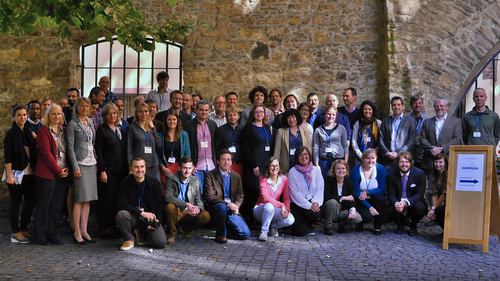
Group photo from the "Testing the methodology acrossEurope" Workshop, Prague; Credit: CzechGlobe
Taking place from 26 – 29 September 2016 in Prague, Czech Republic, ESMERALDA thematic Workshop III was attended by about 60 project partners and stakeholders, who have been directly involved in the case studies, and who provided valuable feedback on the suitability of the methods to be used in different decision-making processes. The event was organized by the ESMERALDA partner CzechGlobe (Global Change Research Institute CAS).
The ESMERALDA Workshop "Testing the methodology across Europe" not only updated participants on the latest scientific and supporting developments within the project, but also aimed at stimulating discussions on a set of selected methods.
Focused on understanding how the selected methods have been applied in three case studies from Latvia, Czech Republic, and Germany, the overall purpose of the Workshop was to start drafting ESMERALDA’s flexible ecosystem services mapping and assessment methods data base, for which among others specific "method cards" were applied.
The methods collection resulting from the various ESMERALDA Workshops, will be gradually compiled and revised during the course of the project and integrated into a holistic flexible methodology for ES mapping and assessment.
The Workshop took place at Karolinum, the historical building of the Charles University in Prague and was supplemented by a field visit to the Třeboňsko UNESCO Biosphere Reserve with a visit to a CzechGlobe LTER monitoring station in the protected landscape area.
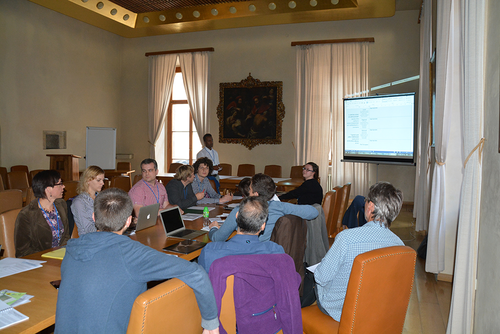
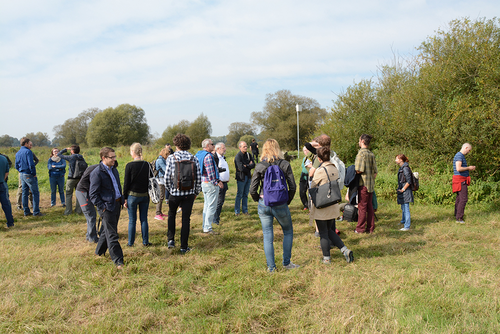
Photos: Discussions during the workshop (left) and Excursion (right); Credits: Pavel Stoev
This issue of the ESMERALDA Insider rubric will introduce you to Marion Potschin-Young. Learn more about Marion’s contribution to ESMERALDA, her research and general interests.
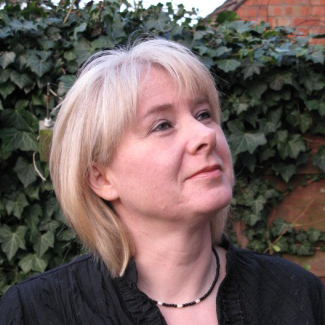 Marion Potschin-Young is director of Fabis Consulting, an consultancy working at the interface of environment and society. Before November 2016 she was Director for CEM (Centre for Environmental Management) at the University of Nottingham. In ESMERALDA she is leader of Work Package 4 and is also acting as a deputy coordinator of the project. Since 2002 she focuses on Ecosystem Service research and their applications, which led her to serve as a reviewer for the European Commission's FP7 programme and project evaluator for FP6 and FP7 on Environment. More recently she is on the advisory board for TEEB-Germany, the German, Swedish but also Belgium and Luxemburg Governmental funding bodies for ecosystem service research. Her latest output is being the co-editor of the "Handbook of Ecosystem Services".
Marion Potschin-Young is director of Fabis Consulting, an consultancy working at the interface of environment and society. Before November 2016 she was Director for CEM (Centre for Environmental Management) at the University of Nottingham. In ESMERALDA she is leader of Work Package 4 and is also acting as a deputy coordinator of the project. Since 2002 she focuses on Ecosystem Service research and their applications, which led her to serve as a reviewer for the European Commission's FP7 programme and project evaluator for FP6 and FP7 on Environment. More recently she is on the advisory board for TEEB-Germany, the German, Swedish but also Belgium and Luxemburg Governmental funding bodies for ecosystem service research. Her latest output is being the co-editor of the "Handbook of Ecosystem Services".
Research:
Generally interested in the way science is used in policy and decision making, Marion is especially looking at how concepts and conclusions are translated between different communities. Working with decision makers is especially important for scientists both to demonstrate the relevance of what they do, but also to identify key problems and challenges which new thinking can address.
Currently, Marion is mainly working on ecosystem service assessment and especially how classification systems can be designed to support a number of purposes. In addition to mapping and assessment, these include ecosystem accounting. Her early background is based on the landscape ecology of the Arctic and Antarctic, but she now mostly focuses on the landscapes and associated biomes that we find in Europe.
Interests:
On a more more personal leve
l, Marion combines her research interests with her hobbies, now working on delivering a lot of ecosystem services through a massive gardening project. Having recently bought a plot of land she is now establishing an orchard, a wildflower meadow and a length of new hedgerow and investigates "how this improves the pollination of fruits and vegetables".

Marion's gardening project.
"While we want to encourage biodiversity in our area, we need to eat too, and so provisioning services are on the menu with a vegetable plot and hopefully chickens," adds Marion with a pinch of humor in her tone. "When not in the garden or working for ESMERALDA I love to cook good fresh food and create interest for healthy nice food for workshops."
In ESMERALDA:
Within the project Marion is leading Work Package 4, which is dealing with integrated assessments, and together with WP3 develops the ideas of a "flexible methodology" to apply and use a set of methods of different scales and Ecosystem Services as a base for the assessment.
At CEM she is currently updating CICES (Common International Classification for Ecosystem Services) with her team on the base of a recent international survey. CICES plays an important role in mapping and assessment within the MAES process, and hence ESMERALDA, but it also ties this work up with the efforts to develop ecosystem accounting methods that are being led by the United Nations.
"We need to find ways of helping people to apply ecosystem service classifications easily and to link it with other classification of ecosystems, ecological functions, benefits and beneficiaries and also different backgrounds and understandings of different groups of users. ESMERALDA will really contribute in these areas," concludes Marion.
Find out about other members here.
Find out more about each member of our team in ESMERALDA Insider. In this issue of the rubric Joachim Maes from the Joint Research Center of the European Commission shares his research interests and motivation in the project.
 Joachim Maes is currently acting as a scientific and technical project officer at the Joint Research Centre of the European Commission (JRC), where he is heavily involved in research activities in support of the famous Action 5 of the Biodiversity Strategy, which is the Commission’s initiative to promote mapping and assessment in the member states.
Joachim Maes is currently acting as a scientific and technical project officer at the Joint Research Centre of the European Commission (JRC), where he is heavily involved in research activities in support of the famous Action 5 of the Biodiversity Strategy, which is the Commission’s initiative to promote mapping and assessment in the member states.
With his work at the JRC having a one-to-one relationship with the objectives of ESMERALDA, Joachim is a deputy-coordinator and task leader of WP2.
About his research interests:
Working closely with policy-makers at the Directorate-General for the Environment of the European Commission, Joachim would still refer to himself as an ecosystem services mapper before anything else.
Giving extra focus to urban ecosystems in his latest work, he is interested to understand the role of biodiversity and ecosystem services of human-dominated ecosystems such as cities and croplands and how it can be mapped and assessed.
Cities, in particular, qualify as laboratories for an ecosystem services approach. In cities the demand for ecosystem services such as clean air, access to green space or storm water regulation is usually high whereas the supply of these services typically runs short.
The new data revolution with the increasing availability of data at very high spatial and temporal resolution coming from different sources like remote sensing but also from citizens needs to be exploited better by ES research.
"I am quite happy with the new MAES report on urban ecosystems. The study showed that there is a lot of scope for urban ecosystem assessment," comments Joachim, "it delivers guidance on how to map urban ecosystems and how to assess their condition and services. An interesting finding is that the Natura 2000 covers as much as 17% of the EU’s urban areas. The management of urban biodiversity will become more important."
The MAES group , where Joachim is a member, is currently testing knowledge co-production as a new collaboration model for the Commission on how ecology and biodiversity policy can work together. This already exists for climate and water policy but it has to be extended to biodiversity policy.

Within ESMERALDA:
Within ESMERALDA Joachim plays an important role facilitating the science-policy interface between the project and the European Commission updating both parties about ongoing developments.
The MAES urban pilot will continue to work during 2017 and 2018 and another step for collaboration would be for ESMERALDA partners who are planning an urban ecosystem assessment or who have interesting data on urban ecosystem services to join this initiative.
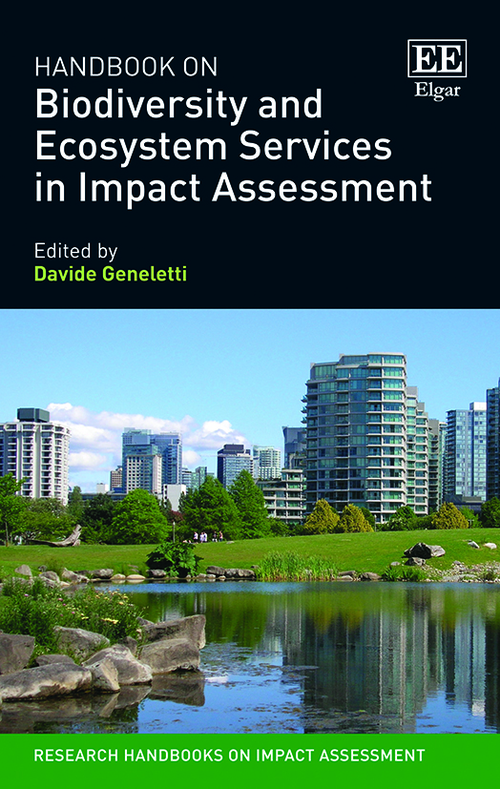 The new new Handbook on "Biodiversity and Ecosystem Services in Impact Assessment", presents methodological guidance and discussion of international practice related to the integration of biodiversity and ecosystem services in impact assessment. The volume edited by ESMERALDA researcher Davide Geneletti, features variety of case studies to provide examples of the use of information on biodiversity and ecosystem services in different types of impact assessment to improve decisions at all levels, from strategic choices to individual projects. The Handbook presents a range of applications and possible solutions to challenges in key policy and planning sectors, including urban development, land use, energy, marine areas, infrastructure, agriculture, forestry, health and tourism.
The new new Handbook on "Biodiversity and Ecosystem Services in Impact Assessment", presents methodological guidance and discussion of international practice related to the integration of biodiversity and ecosystem services in impact assessment. The volume edited by ESMERALDA researcher Davide Geneletti, features variety of case studies to provide examples of the use of information on biodiversity and ecosystem services in different types of impact assessment to improve decisions at all levels, from strategic choices to individual projects. The Handbook presents a range of applications and possible solutions to challenges in key policy and planning sectors, including urban development, land use, energy, marine areas, infrastructure, agriculture, forestry, health and tourism.
Find the handbook on the following links:
http://www.e-elgar.com/shop/handbook-on-biodiversity-and-ecosystem-services-in-impact-assessment
http://www.elgaronline.com/abstract/9781783478989.xml?rskey=Mo1hbU&result=1
The workshop Assessment and Economic Valuation of Recreational Ecosystem Services (RES) of Landscapes in EU Member States will take place at Leibniz Universität Hannover, Germany, on September 12-13, 2016. The workshop picks up the challenge of assessing and valuing ecosystem services as stipulated by target 2, action 5 of the EU Biodiversity strategy (i.e. Mapping and Assessment of Ecosystems and their Services – a process commonly abbreviated as MAES, http://biodiversity.europa.eu/maes).
The objectives of the workshop are:
1. To bring together and discuss the best available knowledge concerning RES of landscapes in EU member states, that is spatial analysis and quantification of potentials, estimation of demand as well as actual use, and economic valuation,
2. To synthesize commonalities and differences, current bottlenecks and new ideas for further research to advance the theory and practice of RES mapping, assessment and economic valuation in the context of MAES, including suggestions for harmonizing the diversity of approaches,
3. To develop material and insights for a joint publication effort on the topic such as a special issue or joint paper, depending upon the interest of participants,
4. To initiate and enhance across EU member states’ knowledge exchange and cooperation around RES assessment and valuation approaches.
The workshop is planned as a 1,5 day meeting addressing (i) approaches and methods for assessing and mapping potentials of RES of landscapes, (ii) approaches and methods for modelling the demand as well asactual use of RES, and (iii) approaches and methods for the economic valuation of RES. A final session (iv) will integrate the results and discuss future steps of cooperation.
To join the workshop, fill in the registration form available in the conference flyer and send it to hermes@umwelt.uni-hannover.de until July 31, 2016. If you wish to present a paper or a poster, please add a short abstract (max. 300 words). The number of participants will be restricted to ensure a reasonably size for collaboration. Therefore, only an early registration will assure your place.
As part of the new 6th Global Environment Outlook (GEO-6) UNEP has just released a separate Assessment for the pan-European region. The report provides an overview on the current state, trends and an outlook for the environment, and also highlights environmental factors that contribute to human health and well-being at the regional level.
The assessment for the pan-European region clearly indicates that biodiversity loss and ecosystem degradation is continuing in the region. Ongoing biodiversity decline and loss is particularly high in Eastern and Western Europe. Some positive developments and individual success stories offer lessons worth learning, for example developments of protected area networks such as Natura 2000 and the pan-European Emerald Network. However, an important challenge that needs urgent attention is improving availability and open access to comprehensive and integrated biodiversity data to support assessments and analysis, as well as planning and implementation of conservation efforts.
The full report can be found here: http://bit.ly/21q2ghL
UNEP press release: http://bit.ly/24A7sQN
Our latest workshop, which took place from 14 to 16 April 2016 in Nottingham, UK, brought together 51 representatives from countries across Europe, including all ESMERALDA partners, together with potential new consortium members. During the event participants looked at developing a common understanding within ESMERALDA of methods for mapping and assessing ecosystems and their services, and how they could be used in the context of different ecosystem types, services, "tiers" and spatial scales, cross-referenced to the CICES framework.
Learn more about the workshop and its outcomes from the video:
Today, ESMERALDA is launching its brand new Insider rubric! Every few weeks we will post profiles of our consrtium members to give you insights on their research interests and role in the project. Tune in to learn about what motivates scientists in their work, and how are they hoping to contribute to society with their research.
To kick start the rubric, we feature two profiles - our project coordinator Dr Benjamin Burkhard pioneers the initiative, alongside SYKE Senior researcher Dr Petteri Vihervaara.
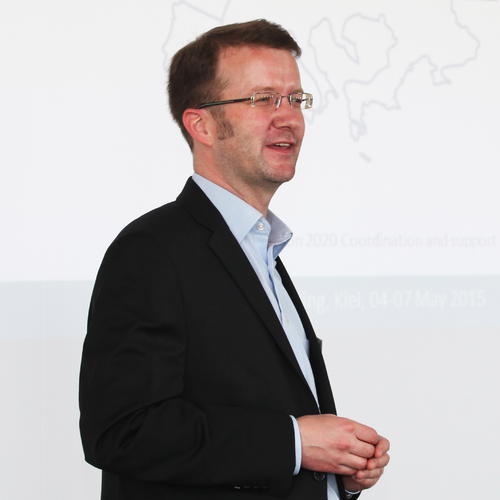
Dr Burkhard is a geographer working as a senior researcher at Kiel University in Germany. Since 2001 he has worked on various ecosystem services projects, involved in research areas ranging across irrigated rice agriculture in Southeast Asia, landscape management in Finland, Bulgaria and integrative coastal zone management in the North Sea.
Being the first project where Dr Burkhard takes the coordinating role, here is what he shared with us on his experience and coming up with the idea behind ESMERALDA.
 Dr Petteri Vihervaara is a senior research scientist at SYKE, currently also working as a research programme manager and coordinating SYKE’s Ecosystem Services research programme.
Dr Petteri Vihervaara is a senior research scientist at SYKE, currently also working as a research programme manager and coordinating SYKE’s Ecosystem Services research programme.
Lately, his work has been deeply linked with the implementation of the Mapping and Assessment of Ecosystem Services (MAES) work in Finland, as well as coordination of new research opportunities on the whole field of ecosystem services and biodiversity. Read more.
Follow the Insider rubric for more updates on the work of our researchers.
A new Special Issue (edited by Benjamin Burkhard, Stefan Hotes and Hubert Wiggering) of the online and fully open-access journal LAND deals with questions of ecosystem services delivery in managed and human-modified systems. Existing agricultural systems in different socio-ecological settings are analysed based on system-oriented modeling and simulation, experimental work, observations, interviews with experts, stakeholders and farmers, and analyses of agriculture and land use systems.
Based on that, concepts for improved agricultural systems that aim to integrate the supply of/demand for multiple agro(eco)system services so as to maintain long-term ecosystem functioning are elaborated.
All articles can be accessed from the journal website.

The first phase of ESMERALDA was dedicated to the identification of relevant stakeholders and stocktaking of the implementation of MAES (Mapping and Assessment of Ecosystems and their Services) in all EU member states.
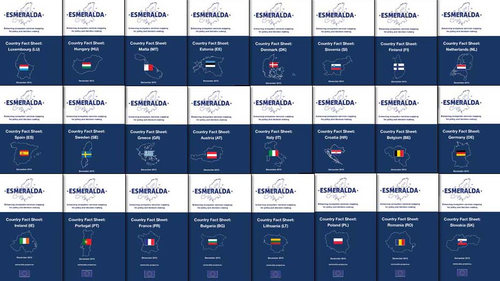
One key outcome of this phase are the EU Country Fact sheets (project Milestone 09) containing information about each country’s MAES-related activities, implementation prerequisites and needs as well as relevant policy and research activities. The fact sheets were produced based on information collected by the ESMERALDA project partners as well as related policy and research activities such as the MAES Working Group and the MESEU project.
All fact sheets are now available on BISE, the Biodiversity Information System for Europe, for the different countries within the platform’s MAES-related developments in the European Union section.
 The sharing of information between ESMERALDA and BISE is based on ESMERALDA Milestone 31, under which stakeholders from the European Commission, different institutions and projects meet regularly to discuss inter-operability of ESMERALDA outputs into common platforms.
The sharing of information between ESMERALDA and BISE is based on ESMERALDA Milestone 31, under which stakeholders from the European Commission, different institutions and projects meet regularly to discuss inter-operability of ESMERALDA outputs into common platforms.
Two other highly relevant outcomes from the first project phase are Deliverables 2.1 "Clustering of EU Member States according to their prerequisites and needs to perform ES mapping and assessment" and 2.2 "Ecosystem service mapping and assessment gaps in EU member states and recommendations to overcome them", giving an overview of the stocktaking of MAES implementation in EU member states. All publicly available reports can be downloaded here.
With the aim of supporting EU countries in the Mapping and Assessment of Ecosystems and their Services (MAES) process, ESMERALDA held a dedicated workshop to look at and discuss existing methods and how they could be used as part of an integrated assessment.
The workshop, which took place from 14 to 16 April 2016 in Nottingham, UK, brought together 51 representatives from countries across Europe, including all ESMERALDA partners, together with potential new consortium members.
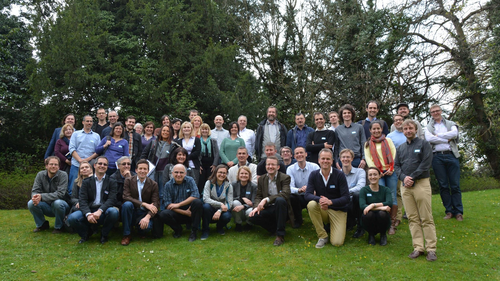
Participants at the ESMERALDA Workshop in Nottingham, UK, 14-16 April 2016; Photo Credit: Pensoft
Using results from existing and ongoing ESMERALDA reports, participants looked at developing a common understanding within ESMERALDA of methods for mapping and assessing ecosystems and their services, and how they could be used in the context of different ecosystem types, services, "tiers" and spatial scales, cross-referenced to the CICES framework.
ESMERALDA aims at supporting European countries in fulfilling their duties in relation to the EU Biodiversity Strategy’s Target 2 Action 5 "Mapping and Assessment of Ecosystems and their Services" (MAES). In the second project phase that has just been started, ESMERALDA will develop a first version of a report on flexible methods for mapping and assessing ecosystem services.
In the discussion sessions the experts looked at biophysical, socio-cultural and economic methods in order to identify the potential relationships between ecosystem services and specific methods, as well as the potential linkages between the methods themselves.
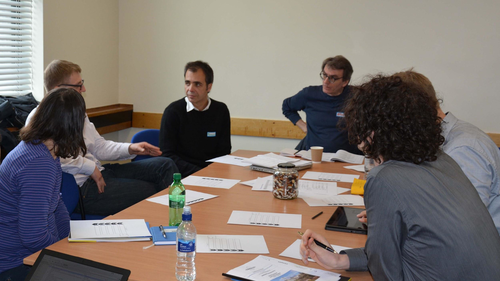
Discussing biophysical methods for MAES in one of five dedicated breakout groups during the workshop; Photo Credit: Pensoft
Results and feedback from the workshop will serve as a basis for the selection of methods to be used and tested within the project’s selected case studies. The final aim is to get an overview of available methods, their strengths and weaknesses and potential application for ES mapping and assessment to serve for building a holistic flexible methodology in the next phase of ESMERALDA.
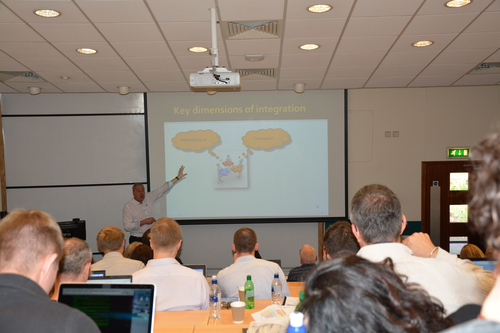
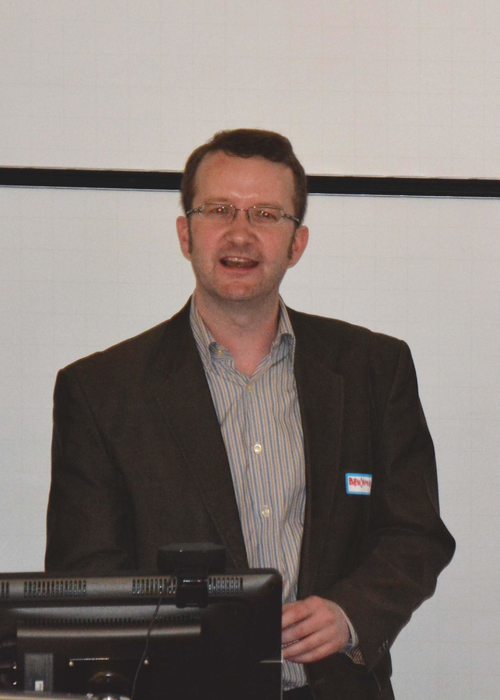

Clockwise from top: Local host from Nottingham Roy Haines-Young on quantification of ecosystem services; ESMERALDA Coordinator Benjamin Burkhard opening the workshop; Field trip at the Melbourne Parklands; Photo Credits: Pensoft
A recent publication in Trends in Ecology & Evolution has posed some criticism on the concept of Ecosystem Services. The article authored by Jonathan Silvertown, University of Edinburgh, draws attention to the argument that this concept, encapsulating the ways in which human society depends upon the existence and functioning of nature, also draws power by chiming with dominant neoliberal ideology.
Since its publication, the article has received some attention from scientists that work within this sphere, resulting into several replies - some of which have been officially published alongside the original piece in the journal. The responses bring more points for consideration and invites for further more holistic and balanced debate within the discipline. ESMERALDA partner Marion Potschin and her colleagues are among the critical reviewers of the original paper.
Learn more and read the article, followed by all published responses here.
Following the 8th ESP Conference last year in Stellenbosch, the new ESP-associated journal One Ecosystem is now ready to welcome your contributions to its first Special Issue "Ecosystem services – methods, data and applications". One Ecosystem is an innovative Open Access scholarly journal that welcomes, in addition to conventional research papers, contributions documenting the entire research cycle, including data, models, methods, workflows, results, software, perspectives and policy recommendations. Contributions from all ESP 8 sessions and ESP Working Groups are welcome!

Scope of the Special Issue
With this Special Issue (and the new Journal) the main intention is to really make a difference, by promoting and supporting methods and data sharing, ideas exchange and dissemination of relevant applications in the sphere of ecosystem services. For this reason, the focus of this Special Issue is kept broad, welcoming all contributions related to ecosystem service research methods, data and their applications in science, policy making, society and practice. Please contact one of the Special Issue editors in case you are unsecure whether your specific topic is fitting.
Timeline
Call for papers: March 2016
Indication of interest (authors): April 11, 2016 (but also later indications may be considered)
Submission of papers: any time, but preferably before June 1, 2016
Publication individual papers: when ready
Collection for Special Issue: September 2016
Download the official Call for Papers here.

